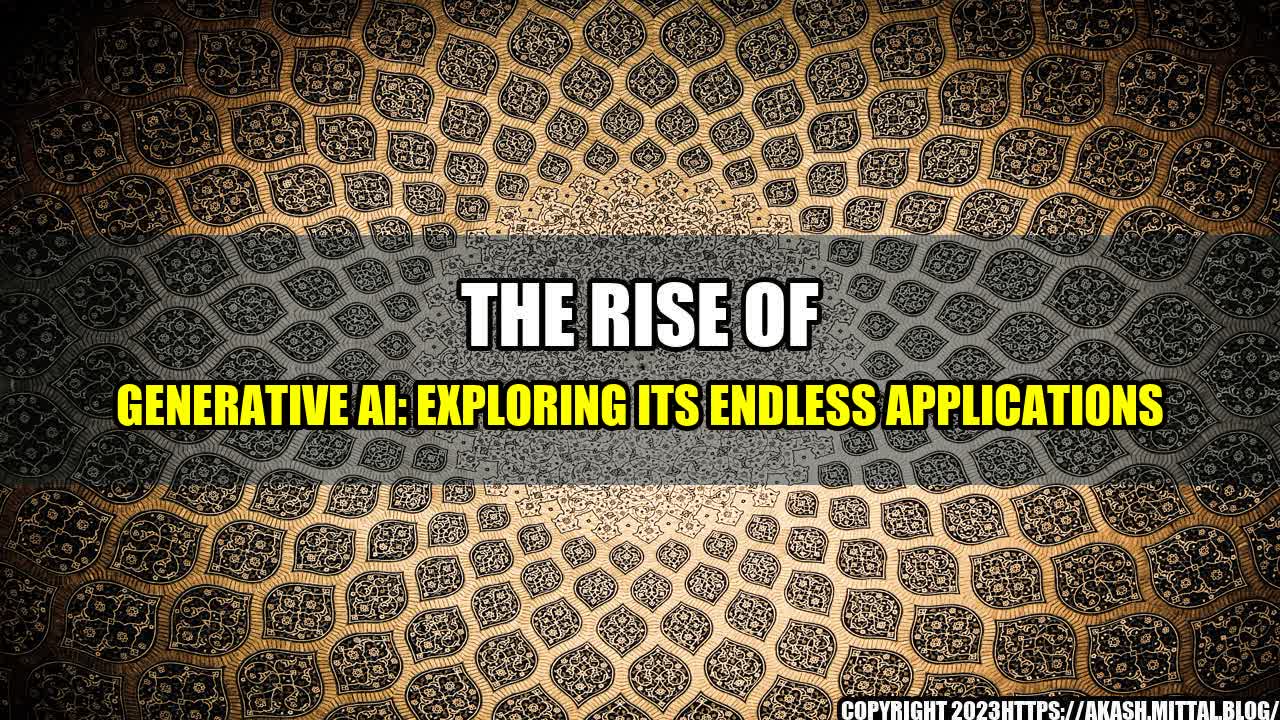
Five years ago, a young artist named Robbie Barrat decided to use generative AI to create art. He fed the software thousands of images of classical paintings and instructed it to create a new painting in its unique style. The end product was remarkable - it looked like something that could sit in a museum next to the greatest works of the 18th century. Since then, generative AI has come a long way, expanding its applications to fields like healthcare, finance, education, entertainment, and more.
Generative AI, in simple terms, is a type of artificial intelligence that mimics humans' ability to generate and create new content, such as text, images, videos, and audio. It uses machine learning algorithms to study and analyze large datasets, then creates its output based on that information. In the past few years, generative AI has become increasingly popular among researchers, startups, and big companies, as its potential for innovation and problem-solving is virtually endless.
Let's take a look at some examples of how generative AI is already changing the world:
In Healthcare:
In 2019, Intel and the University of Pennsylvania used generative AI to predict the onset of Alzheimer's disease in patients up to six years before the first symptoms appeared. The algorithm was trained on over 2,000 PET scans and brain MRIs from patients with and without Alzheimer's, enabling it to detect subtle patterns and anomalies in the brain that could indicate the disease. This could have a significant impact on early intervention and treatment for Alzheimer's patients in the future.
In Finance:
JP Morgan Chase recently developed a generative AI program that can write financial reports with speed and accuracy. The model analyzes data from hundreds of thousands of annual and quarterly reports, then generates its own reports, complete with key financial metrics and insights. This could save analysts countless hours of research and writing, enabling them to focus on higher-level tasks and improving the accuracy of their financial forecasts.
In Education:
The OpenAI team developed a language model called GPT-3 that can generate human-like responses to prompts and queries. This has the potential to transform the way students learn and interact with educational materials. For example, GPT-3 could generate personalized study guides, answer students' questions about complex concepts, or even write essays based on students' inputs. This could help educators improve learning outcomes and make education more accessible to students from all backgrounds.
In Entertainment:
Generative AI has already made an impact on the entertainment industry, from creating realistic avatars in video games to generating movie scripts. In fact, a team of researchers recently used GPT-3 to generate a short film script, which was then turned into a film by a human crew. The final product was surprising and unique, showcasing the endless possibilities of generative AI in the creative industry.
Conclusion:
Generative AI is just getting started, and its future is looking bright. It has the potential to revolutionize the way we approach healthcare, finance, education, entertainment, and more. Here are three key takeaways from this article:
- Generative AI can analyze and learn from massive datasets to create new content that is unique and useful.
- It has applications in a wide range of industries, from healthcare to entertainment, and could transform the way we approach complex problems.
- As the technology improves and becomes more accessible, we can expect to see even more innovative and creative applications of generative AI in the future.
References:
1. https://newsroom.intel.com/news-releases/intel-alzheimers-disease-ai-diagnostics/#gs.nyob3b
2. https://towardsdatascience.com/how-jp-morgan-chase-is-using-ai-to-write-faster-financial-reports-b3fa9b75f191
3. https://openai.com/
4. https://venturebeat.com/2021/01/01/how-ai-is-changing-film-making-according-to-science-fiction/
Hashtags: #GenerativeAI #AIapplications #Artificialintelligence #Healthcare #Finance #Education #Entertainment
Keywords: Generative AI, machine learning, healthcare, finance, education, entertainment, big data, artificial intelligence, problem-solving, language model.
Category: Technology, Innovation, Artificial Intelligence.
Curated by Team Akash.Mittal.Blog
Share on Twitter Share on LinkedIn